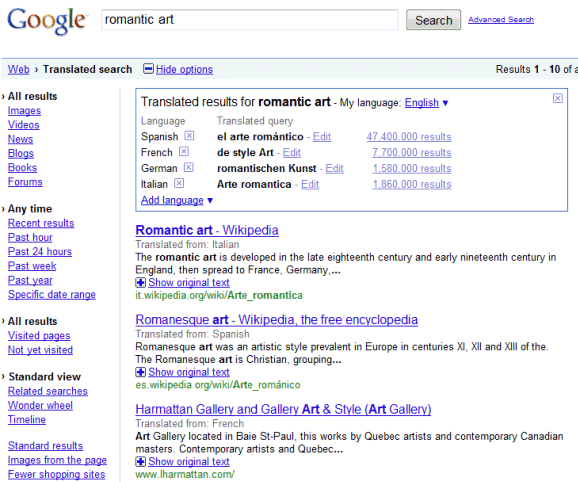
Google automatically suggested a few languages for your query, but you could manually add other languages. Your query was translated into all these languages, Google performed multiple searches for the translations, compiled a list of results and translated titles and snippets into your language.
Here's a screenshot from 2009, when Google Search added this feature:

"If you're traveling and want to find hotels, restaurants, activities or reviews written from a local perspective, or if you're just curious to find what's being written about a company, product or topic in another language, give Translated search in the Search Options panel a try," suggested Google at that time.
The feature was first available in 2007 as part of Google Translate, but the initial version supported a single destination language. "Now, you can search for something in your own language (for example, English) and search the web in another language (for example, French). If you're looking for wine tasting events in Bordeaux while on vacation in France, just type 'wine tasting events in Bordeaux' into the search box on the 'Search results' tab on Google Translate. You'll then get French search results and a (machine) translation of these search results into English," informed Google.
It's sad to see this feature disappear because it was very powerful and difficult to replace. It integrated Google Translate and Google Search, so Google performed multiple translations and searches just to shows you 10 cross-language search results.
Why was it removed? "The translate foreign pages feature is no longer offered. Removing features always involves tough choices, but we do think very hard about each decision and its implications for our users. You can still translate entire pages in Chrome. Streamlining enables us to focus on creating beautiful technology that will improve people's lives," explained Google. Most likely, not many people used this feature.
I assume that most "search tools" features are rarely used and the same thing is true for other features for power users: advanced search, operators. They're not obvious, they're difficult to use and few people need them. As Google focuses more on answering questions, I expect to see fewer and fewer advanced search features and that's disappointing.

This is an amazing tool. I can think of hundreds of people that can benefit from this. Could the initial marketing of the tool lead to the low usage volumes? Was it communicated to countries where english was not the first language. I was trying to help my non-english speaking friends out and thought such a tool would enable them to help themselves. However, my recent search of this "idea/tool" has only yielded articles in english. Which is a problem because no english reader has any use for such a tool.
ReplyDelete